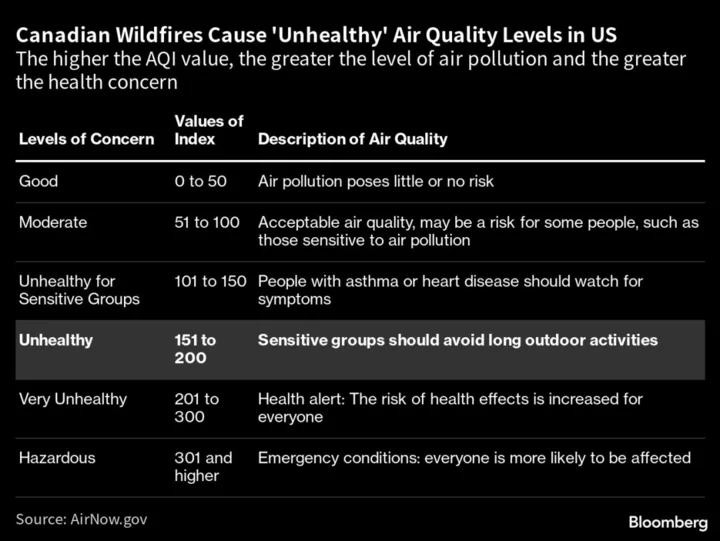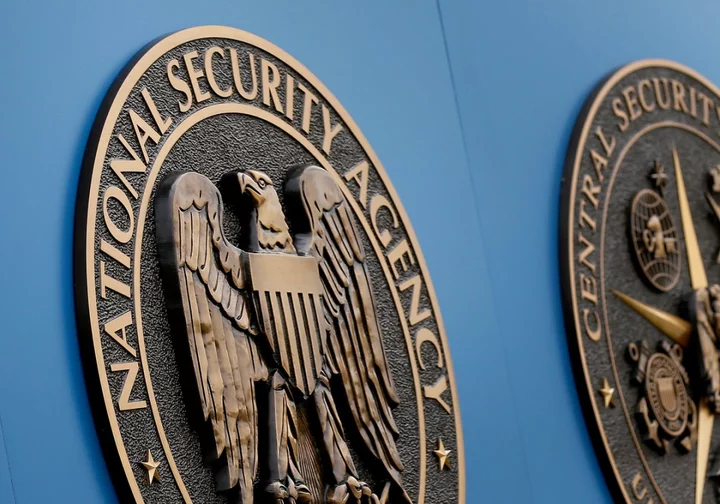
Starmer Vows to Boost UK Steelmaking as He Makes Pitch for Power
UK opposition leader Keir Starmer will commit his Labour Party to boost domestic steel-making as he battles to
2023-06-08 13:15

Australia to introduce national ban on Nazi symbols
The move comes amid a resurgence in far-right activity.
2023-06-08 12:59

Korea Flags Need to Fight Currency Wash Trades as Reforms Deepen
South Korea’s authorities flagged the need to combat wash trading in its foreign-exchange market, as the country pushes
2023-06-08 12:59

Asian shares stumble as traders sweat on Fed rates
By Ankur Banerjee SINGAPORE Asian shares slid on Thursday after a surprise interest rate hike by Bank of
2023-06-08 12:58

Pakistan faces last IMF board review before passing crucial budget
KARACHI, Pakistan Pakistan can have only one remaining board review under the current bailout package of the International
2023-06-08 12:54

Australia’s Trade Surplus Narrows as Iron Ore Exports Slide
Australia’s monthly trade surplus narrowed more than expected in April — while still remaining healthy — as exports
2023-06-08 12:47

How Safe Is It to Go Outside and Other Wildfire Smoke Issues
Millions of Americans woke up to apocalyptic, orange skies Wednesday as thick smoke from wildfires in Canada moved
2023-06-08 12:29

China Financial Watchdog Vows to Further Open Up, Curb Risks
China will continue to open up its $60 trillion financial market to foreign banks and investment firms, while
2023-06-08 12:28

Russians shooting at rescuers in flooded areas following dam collapse, Zelensky says
Russian forces have been shooting at Ukrainian rescuers trying to reach flooded areas in the Kherson region that are under Russian control, Ukrainian President Volodymyr Zelensky said Wednesday.
2023-06-08 12:27

Catch up with the moments you missed from Pence's town hall
Former Vice President Mike Pence officially entered the 2024 GOP primary field in his bid for the White House. In a CNN Republican town hall hosted by Dana Bash, the former Indiana governor took questions from voters who intend to participate in the Iowa Republican caucuses.
2023-06-08 12:25

AP-NORC poll finds both Democrats, Republicans skeptical of US spying practices
As it pushes to renew a cornerstone law that authorizes major surveillance programs, the Biden administration faces an American public that's broadly skeptical of common intelligence practices and of the need to sacrifice civil liberties for security. Congress in the coming months will debate whether to extend Section 702 of the Foreign Intelligence Surveillance Act. Section 702 authorizes U.S. spy agencies to collect large amounts of foreign communications for intelligence purposes ranging from stopping spies to listening in on allies and foes. Those collection programs also sweep up U.S. citizen communications that can then be searched by intelligence and law enforcement officers. The new poll from The Associated Press-NORC Center for Public Affairs Research shows that Democrats and Republicans have similar views on surveillance tactics, while Republicans have become substantially less likely over the last decade to say it's at least sometimes necessary to sacrifice freedom in response to threats. U.S. intelligence officials say Section 702 is necessary to protect national security and to counter China, Russia and other adversaries. They credit the program with better informing U.S. diplomats and enabling operations like last year's strike to kill a key plotter of the Sept. 11, 2001 terrorist attacks. But officials will have to overcome sharp divisions in Congress and bipartisan anger at the FBI, though most observers still believe Section 702 will be renewed in some form. Driving a political shift is increasing skepticism among Republican elected officials of the FBI and intelligence agencies. Conservatives have battered the FBI for misleading the primary surveillance court in its investigation into former President Donald Trump campaign’s ties to Russia. Trump and other top Republicans often accuse the so-called government “deep state” of using its powers to target conservatives. Historically, “the left flank has been the more vocal objector to government surveillance on privacy and civil liberties grounds,” said Carter Burwell, who was chief counsel to Sen. John Cornyn, R-Texas, when the law was last renewed in early 2018. ”Over the past five or 10 years, with the rise of the libertarian wing of the Republican Party, call it the antigovernment wing of the Republican Party, that is an equally vocal and powerful plurality," said Burwell, now a lawyer at the firm Debevoise & Plimpton. The poll asked U.S. adults whether they support several practices authorized by Section 702. It found that 28% of adults support the government listening to phone calls made outside of the U.S. without a warrant, while 44% oppose the practice. Views are similar about the U.S. reading emails sent between people outside of the U.S. without a warrant. The public was more receptive to surveillance of activity outside of the U.S. a decade after the Sept. 11, 2001 attacks. That shifted significantly by the 20th anniversary of the attacks in 2021. In the latest poll, 48% of Americans this year said they believed it necessary to sacrifice their rights and freedoms to prevent terrorism, down from 54% in 2021 and nearly two-thirds in 2011. That shift was especially dramatic among Republicans, with just 44% saying that's sometimes necessary compared with 69% in 2011. Among Democrats, 55% still say so, similar to the 59% who said so in 2011. Sarah Apwisch, a 57-year-old from Three Rivers, Michigan, described herself as somewhat opposed to the monitoring of foreign emails and phone calls. A Democrat, Apwisch said she was “mostly pro-FBI” but concerned after years of negative stories about the bureau. “Honestly, I don’t want to hear anything about the FBI,” she said. “I want the FBI to go do their business and not be in the news because they’re doing their job well and not doing things that make waves. How they do that, I don’t know.” Apwisch also said she supports the FBI and other agencies trying to hunt down enemy spies, but was uncertain about whether the FBI should also use foreign intelligence to investigate other U.S. crimes. White adults were somewhat more likely to say they were opposed to various forms of surveillance — 48% said they opposed the government listening to foreign calls without a warrant — than Black or Hispanic adults, each at 34%. Rob Redding, a 47-year-old journalist who lives in New York City, said he was neutral about many surveillance practices — but said he felt that way because as a Black man, he didn't expect to have privacy. Redding mentioned the FBI's spying in the 1960s on Martin Luther King Jr. and other civil rights leaders as well as officials in Black nationalist movements. “As a Black man in America, as someone who speaks out about the government all the time, I understand that Black people and especially Black leadership cannot trust America," Redding said. In Congress, some Democrats and Republicans have found common cause over their complaints about Section 702. Two lawmakers earlier this year issued a statement calling for an end to U.S. surveillance without a warrant. Rep. Pramila Jayapal, D-Wash., chairs the liberal Congressional Progressive Caucus, while Rep. Warren Davidson, R-Ohio, is a member of the conservative House Freedom Caucus. “We must take this opportunity to reform Section 702 and overhaul privacy protections for Americans so that they truly protect the civil rights, civil liberties, and privacy rights that are foundational to our democracy,” Jayapal and Davidson said. Previous lawmaker efforts to require warrants for searching intelligence databases have failed. Intelligence officials argue they have ramped up training for agents searching the databases and tightened requirements to consult with lawyers on sensitive queries. Supporters of Section 702 argue most U.S. adults want the government to stop foreign adversaries even if they state misgivings about how American intelligence operates. Glenn Gerstell, a former general counsel at the National Security Agency who is advocating for Section 702 to be extended, noted that while Congress has to be responsive to public opinion, “some of this gets pretty technical and isn’t easily understood by the public.” He said he still believed the law would be renewed with some amendments to bolster civil liberties protections and enshrine into law changes that the FBI has made in response to a series of wrongful uses of foreign intelligence. “At the end of the day, I think most members of Congress understand the value of the statute and understand that when we don’t have the statute, there is no substitute,” Gerstell said. ___ Associated Press writer Emily Swanson contributed to this report. ___ The poll of 1,081 adults was conducted March 16-20 using a sample drawn from NORC’s probability-based AmeriSpeak Panel, which is designed to be representative of the U.S. population. The margin of sampling error for all respondents is plus or minus 4.0 percentage points. Read More Ukraine war’s heaviest fight rages in east - follow live Charity boss speaks out over ‘traumatic’ encounter with royal aide Haitians are dying of thirst and starvation in severely overcrowded jails As winter warms, farmers in southern US find ways to adapt Smoky haze blanketing US, Canada could last for days as wildfires rage, winds won't budge
2023-06-08 12:23

Solar Power in US to More Than Double by 2028 as IRA Spurs Usage
The US solar market is on track to more than double over the next five years as the
2023-06-08 12:19
